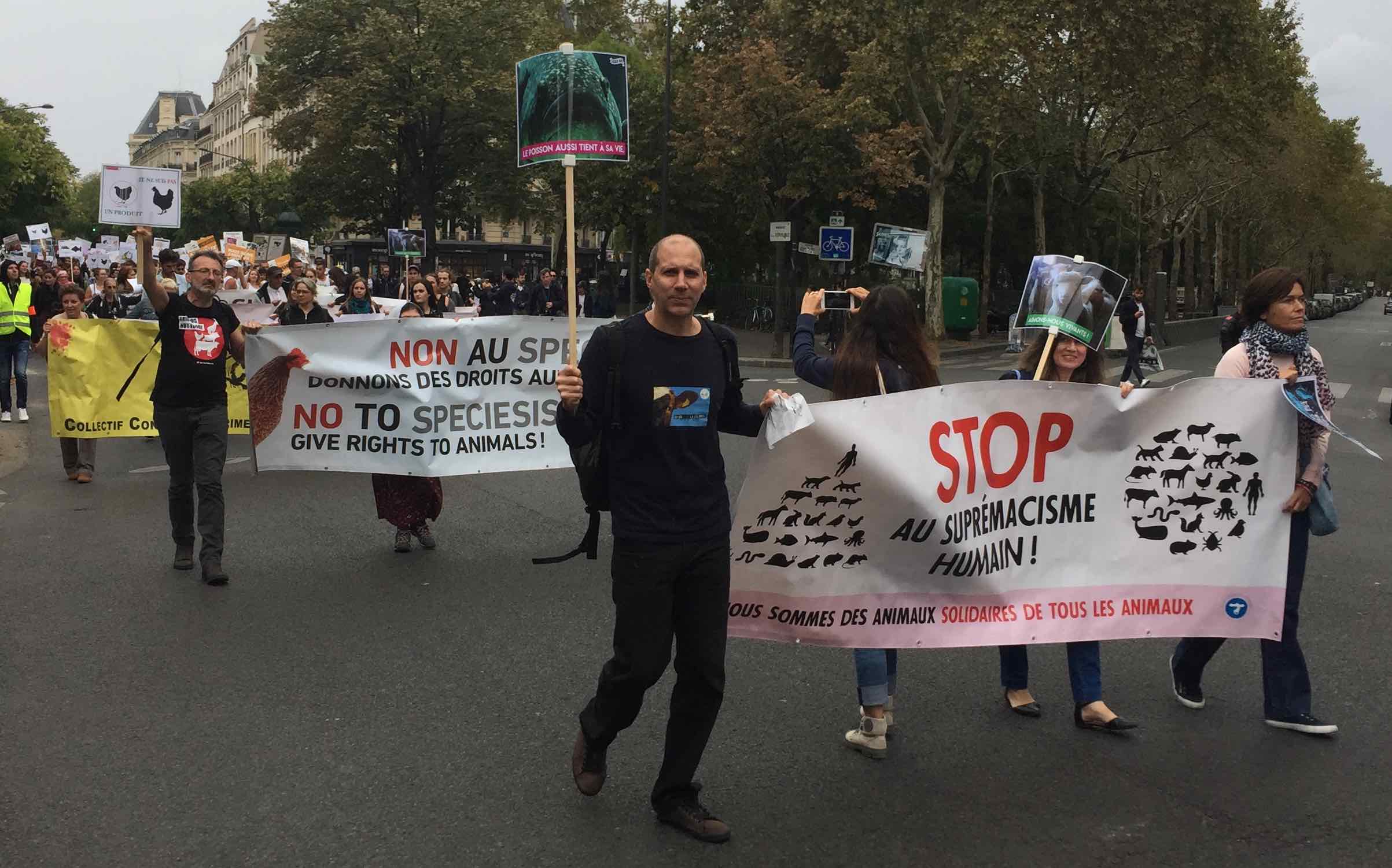This short article1 argues that
- Antispeciesism is a political position. It must therefore be constituted as a movement that pursues political goals;
- As a political movement, antispeciesism is necessarily opposed to all forms of discrimination;
- Since its goals are political, its strategy must be political as well;
- If successful, this movement could be the beginning of a radically different future for all sentient individuals, regardless of their species or origin.
* *
*
In all societies, in all historical periods, the other animals have been discriminated against simply because they do not belong to the human species. This discrimination is called speciesism. At the same time, there have always been people who recognised that animals were unjustly disregarded and, as far as possible, took a stance against it.
However, it is only in the last forty years that speciesism has been rejected by a significant, and organised, number of individuals. For the first time in history, social change is possible. These are the individuals who make up the antispeciesist movement. Unlike other victims of injustice, nonhuman animals cannot free themselves from the discrimination to which they are subjected.
Thus, it is only through the success of this movement that their interests will be fully respected. Nevertheless, that success requires from the people who integrate it to more clearly define their goals and to adopt the most effective strategies to achieve them. This is my contribution to a conversation we must all have together.
The Political Goals of the Movement
Antispeciesism is a political position, so it must be constituted as a movement that pursues political goals. This is because speciesism is not only manifest in individual attitudes and practices. It also underlies the social institutions (economic, legal and political) through which human beings organise themselves, as well as the shared beliefs that legitimise and reproduce such institutions. Nonhuman animals are not considered political subjects whose interests must be taken into account to determine the common good. For all institutional intents and purposes, animals are things.
This is the obvious case of animals under human control, which are harmed by being exploited as mere resources in productive processes. The goal of the antispeciesist movement, even if it includes achieving a change in individual attitudes, is therefore not reducible to this. It must be expanded to achieving structural change, by pursuing a non-discriminatory political system in which the interests of all nonhuman sentient beings are protected by robust mechanisms of rights and guarantees.
Firstly, the rejection of speciesism is not simply an expression of personal preference, but an ethical stance. If speciesism is an arbitrary discrimination, then it is morally unjustified. The possibility of discriminating against nonhuman animals is not a legitimate personal choice, just as the adoption of other forms of discrimination such as sexism, cissexism, homophobia or racism is not. It is therefore inconsistent to reject speciesism and at the same time believe that there is no moral problem with other people accepting it.
On the other hand, the sense of fighting against injustice is not to preserve the moral rectitude of those who oppose it, but to prevent or mitigate the harm suffered by those affected by it. The goal of those who consider themselves antispeciesists cannot therefore be reduced to avoiding their own discriminatory attitudes or practices. The goal should be broadened to ensure that as many people as possible take fully into account the interests of sentient individuals of other species.
Secondly, the goal of the antispeciesist movement is not simply to end the harms that the other animals suffer at the hands of humans, particularly in the different industries in which they are exploited. Therefore, although the success of the movement partially consists in achieving a vegan society, this is no enough. Discrimination is not just about harming, but also about unjustifiably refusing to assist those in need. Therefore, speciesism is also manifest in the refusal to help animals in cases in which we would help human beings.
This happens when animals are harmed, not by human action, but by natural events. The vast majority of animals do not live under human control, but in nature. Contrary to popular belief, their lives are not at all idyllic. What prevails in them is suffering and premature death. A movement that does not take the interests of these animals into account simply because they live in the wild would incur in the same kind of discrimination that it denounces against those who accept animal exploitation. Our goal must also be to improve the lives of these animals.
Thirdly, as a political movement, antispeciesism is necessarily opposed to all forms of discrimination. However, the antispeciesist movement as such, however, cannot be committed to more general political theses. This is because the rejection of speciesism does not depend on adopting any particular political view, from right-wing to left-wing libertarianism. On the one hand, speciesism is not the result of implementing in human societies any of these political positions. On the other hand, insofar as they do not reject speciesism, they all propose political and economic systems based on the discrimination against nonhuman animals. Finally, all these positions are similarly compatible with antispeciesism, in that the same arguments that lead them to oppose discrimination among human beings should also lead them to oppose discrimination against other animals.
Those who are part of the anti-speciesist movement, beyond their common rejection of all forms of discrimination, have divergent political beliefs. Among informed, intellectually honest individuals who reject all forms of discrimination, there are deep political disagreements which shall not disappear. This political pluralism cannot be eliminated under conditions of freedom. There are those who reject the legitimacy of any authority. Some believe that there can be legitimate authorities, including the state, provided that certain conditions of justice are met. In addition, different people may have different, more or less egalitarian, conceptions of justice itself. Or different conceptions about the political role that the market should play. All of these are important questions. It is perfectly legitimate for each to to participate in movements that try to transform the entire political system according to the positions they deem most justified. However, in turn, we must accept that those who disagree with us on these political issues do not reject speciesism less strongly, or should be absent from the spaces of reflection and action in defence of animals.
Moreover, given the number of nonhumans who suffer and die, as well as the severity of the harms they suffer, it is not justified to subordinate the fight against speciesism to these other causes. This implies that individuals with any political position may be members of the movement, as long as they reject discrimination among humans and against nonhumans. It also implies that it is a mistake for the movement to present itself to the rest of society – in terms of its practice and its discourse – as being linked to positions other than the rejection of any discrimination against sentient individuals. The opposite would imply the exclusion from the movement of individuals committed against speciesism, with the consequence of reducing its potential fro positive impact. Thus, whatever the different legitimate political positions of its members, the antispeciesist movement as such cannot intend a complete change of institutional model.

Effective strategies for animals
When the goal we pursue is ethical, not trying to adopt the best strategy to achieve is not only irrational, but immoral. This is because failing in our strategic choices reduces the chances of ending speciesist discrimination in as little time as possible. The result is an increase in the harms that future nonhuman animals will suffer.
One strategy is better than another to the extent that it is more effective, that is, to the extent that we can expected to enable us to get closer to our goals with fewer resources. In the case of the struggle against speciesism, we must identify those strategies that allow us with fewer resources to save the greatest number of nonhuman animals from suffering and death. The question about what is the most effective strategy, or group of strategies is, therefore, an empirical one. The strategic problems of the movement cannot be solved by an appeal to our emotions or by simple logical reflection, but starting from data obtained from rigorous studies in psychology, statistics, political science and other social sciences.
Since the objectives are political, the strategy must be so as well. This does not mean, as we have seen, that the we should adopt the discourse or trappings of a particular political view. This means that the interventions we adopt must affect both the speciesist beliefs and behaviours in society as well as the social institutions that reinforce these beliefs and behaviours. This implies recognising that the actors we must influence are not only citizens, but also states and big transnational corporations. The latter pursue goals incompatible with antispeciesism, have money and exert strong political pressure. This has important consequences.
Without a doubt, most of the antispeciesist movement must be composed of ordinary people who set aside some of their time and effort to defend animals. But in the face of the concerted power of public and private institutions that protect the speciesist status quo, this is not enough. Along with these people, there must be professional advocacy organisations with sufficient economic resources and the capacity to operate in the international arena.
The reality is that we do not know with complete certainty which strategies are the most effective for animals. It is only recently that there people who employ more rigorous methods in order to assess the impact of different interventions in order to determine which can do the most good. But we can conclude that the traditional way of framing our strategic thinking – either we defend that we must only educate in injustice of all exploitation with a view to abolishing it or we defend prohibitions or reforms with a view reducing the harms that animals suffer – is a gross simplification of a complex problem. This prevents us from thinking correctly about it, and misleads us to solutions that are as appealing in their clarity and simplicity as probably false.
On the one hand, it is not true that all we should do is educate people against animal exploitation, since that is tantamount to discriminating against wild animals. Talking about veganism only is avoiding most of the problem. Our value-spreading interventions should focus on recognising that speciesism is unjust and must be rejected. On the other hand, we know that in speciesist societies that ignore the situation of nonhumans, campaigns that raise awareness on the situation of certain animals increase favourable attitudes towards them. Furthermore, we know that industry is afraid of well directed reform campaigns, because they make their cruelty visible, affect their public image, increase production costs and reduce demand for animal products, thereby reducing the number of exploited animals.
Furthermore, human beings are not perfectly rational and are more likely to recognize the injustice of speciesism if they find it less difficult to reject animal exploitation in their daily lives. Changing the market so that there are more affordable and attractive plant-based makes behavioural change easier, facilitating an attitudinal towards the situation of animals. Individuals educated in a society less inclined to tolerate harm to nonhumans, and with less difficulty in living without exploiting them, will be more receptive to fully respecting them.
A Complete Liberation
Human societies are speciesist. Nonhuman animals have always been exploited as resources, and in the case of those who live in nature, they have been abandoned to their fate. The rejection of speciesism, contrariwise, is a very recent social phenomenon. It has reason on its side and is motivated by a true solidarity towards all sentient individuals, but it would be a fatal error to believe that reason and solidarity suffice to achieve a world without discrimination. It is necessary to escape a way of thinking based on platitudes, and recognise that the ethical and strategic problems we face are difficult.
But we must also recognise that, if successful, this movement can be the beginning of a radically different future for all sentient individuals, regardless of their species or origin. A future in which human beings do not use their privileges to benefit at the expense of others, but to put them at the disposal of the rest of individuals.
The antispeciesist movement is generally perceived as a struggle for liberation. That is true, but it must now be understood it in a broader sense. The goal is the complete liberation of nonhuman animals from all harm. Not only that animals are free from human oppression, but also free from all necessity, all illness and all suffering. This is the world, I think, to which we must aspire and to which we must devote all our energy and all our strength.
Eze Páez is a Beatriu de Pinós Postdoctoral Fellow at the Law & Philosophy Research Group at Pompeu Fabra University (Barcelona). His research focuses on the development of a neo-republican theory of the political status of nonhuman animals, as well as on our moral obligations to help wild animals suffering harms from natural causes. He has published in prestigious international journals, such as Analysis, Pacific Philosophical Quarterly, Utilitas, Bioethics, or Futures. He is a founding member of the UPF-Centre for Animal Ethics, a think-tank devoted to the promotion of non-speciesist ethical approaches in academia, politics, media and public opinion.
Note:
- This article by Eze Páez has been translated from Spanish into English from the article entitled “Posición política: antiespecista” from the blog “El caballo de Nietzsche” in the periodical eldiario.es on 30 June 2017, by Regulus Atilius and Anne MacLeod, and reviewed by Eze Páez.


